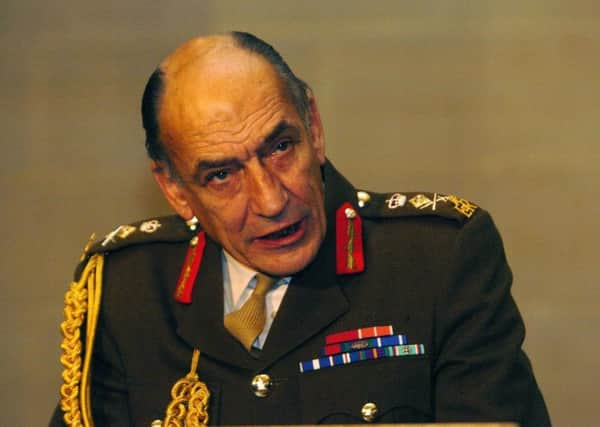Bloody Sunday Para herald of Iraq's bleak post-invasion future


Newly declassified correspondence between the former Army Chief of Staff and two former Chiefs of the Defence Staff, including General Sir Michael Walker, who commanded a battallion of the Royal Anglican Regiment in Northern Ireland in the early 1970s, was published with the Chilcot report on Wednesday, July 6.
General Jackson who served as Chief of the General Staff from the commencement of the invasion of Iraq until August 2006, acted as a sober counter-check to over‑optimistic voices from other quarters, the report reveals.
Advertisement
Hide AdAdvertisement
Hide AdThe report shows that after visiting Iraq in early May 2003, General Jackson observed: “A security vacuum still exists [in Baghdad] ... particularly at night.
“Looting, revenge killing and subversive activities are rife...Should a bloody and protracted insurgency establish itself in Baghdad, then a ripple effect is likely to occur.”
General Jackson also recognised that the “UK’s ability to maintain the consent” of the people in the Basra region, which was under its control, depended “on a stable and secure Baghdad.”
Correspondence shows that he advised: “The bottom line is that if we choose not to influence Baghdad we must be confident of the US ability to improve [its tactics] before tolerance is lost and insurgency sets in.”
Advertisement
Hide AdAdvertisement
Hide AdBy October 2005, when Prime Minister Tony Blair was optimistic about the prospects of the Iraqi Security Forces and police taking a greater role over their own affairs, General Jackson wasn’t so sure, raising concerns about the Iraqi forces’ effectiveness to General Walker.
“It is not to our credit that we have known about the inadequacies of the Iraqi Police Service (IPS) for so long and yet failed to address them,” he said.
By May 2006, a little over a year before UK troops pulled out of Basra, Mr Blair had to be told how the US military was singularly unimpressed by the UK’s “failure to grip the security situation in what they regard as a strategically vital part of Iraq.”
General Jackson reported: “The perception, right or wrong, in some – if not all – US military circles is that the UK is motivated more by the short‑term political gain of early withdrawal than by the long‑term importance of mission accomplishment; and that, as a result, Multi-National Division (South-East) operational posture is too laissez faire and lacks initiative.”
Advertisement
Hide AdAdvertisement
Hide AdHe was also pessimistic about the future of Iraq, correctly, given the development of the insurgent group Al-Qaeda in Iraq into Islamic State.
Chilcot reports: “Accounts from mid‑2006 suggested that security in MND(SE) was a significant concern, characterised by ‘steady, if generally unspectacular, decline.’”
General Jackson judged: “What we will leave behind will not look much like strategic success. Ten years hence our strategy may fully bear fruit.”
The former Chief of Staff of the Army, was Adjutant of 1 PARA on Bloody Sunday and, as such, testified before the Saville inquiry.
Advertisement
Hide AdAdvertisement
Hide AdIn a written statement to that inquiry, he claimed paratroopers had not intended to kill anyone on that day and that they had been attempting to carry out an arrest operation.
“I have heard it said that the events that day occurred as a result of a huge conspiracy.
“Two cabinets, two prime ministers and two generals, Ford and Tuzo would have to know of any such ‘concealed plan’ as would Brigadier McLellan, Colonel Wilford and indeed the entire Battalion.
“Such an operation could not have been planned orally and there would have been a piece of paper somewhere. It is ridiculous to suggest that there was
a plan of that nature but that nothing ever came out. It could not and did not happen. The idea is totally absurd,” he testified.